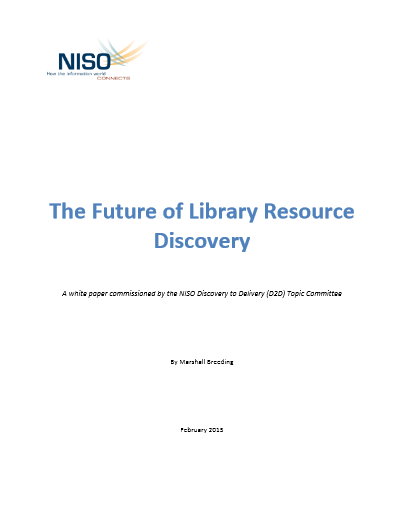 The Future of Library Resource Discovery
The Future of Library Resource Discovery
A white paper commissioned by the NISO Discovery to Delivery (D2D) Topic Committee
By Marshall Breeding
Baltimore, MD: NISO, February 2015
Información original y descarga: http://librarytechnology.org
Introduction
Libraries have a strategic interest in the tools and technologies that facilitate the discovery of and access to the resources for the communities that they serve. These tools have seen steady advancement over recent decades, making great strides in the scope and depth of materials addressed and in providing library users ever more convenient ways to access these materials. The progress seen in the successive generations of technology beginning from online catalogs, to metasearch tools, to the current generation of index-based discovery services represents an incredible improvement. Yet many gaps remain relative to the potential of more universal access to the universe of content of interest to libraries and their users and obstacles remain that impede progress that NISO or other organizations can address.
This paper provides an overview of the current resource discovery environment and discusses some of the possibilities regarding how these technologies, methodologies, and products might be able to adapt to changes in the evolving information landscape in scholarly communications and to take advantage of new technologies, metadata models, or linking environments to better accomplish the needs of libraries to provide access to resources.
The paper will include recommendations that can be addressed in the short term through a possible extension of the NISO Open Discovery Initiative as well as longer-term efforts that investigate how evolving technologies such as open linked data can be operationalized. Areas of possible activity include: a second phase of the Open Discovery Initiative that tackles topics considered out of scope in its initial phase; facilitating more cooperative development of the application program interfaces (APIs) that comprise the ecosystem among discovery services, resource management systems, learning management systems, and other components in a campus information environment; promoting additional research in the extension of index-based discovery services to take advantage of the emerging realm of open linked data.
The paper will also attempt to look beyond the current model to explore other alternatives, especially related to the realm of linked data. To whaextent can we expect that the universe of content of interest will be available as open linked data? What technologies would facilitate improved user experience based on linked data? What new capabilities would be possible?
This paper does not aim to make detailed comparisons of products, but to observe that this product genre continues to experience significant momentum in its development trajectory. Areas of interest or concern for this white paper include exploring or identifying the factors that cause significant barriers to progress, if there are methods with the potential to improve discovery that have not been adopted by the current field of discovery services and need additional exploration or stimulation, or if there are opportunities to lower thresholds of entry to enable additional organizations to contribute to the discovery services arena.




Se han bloqueado los comentarios.